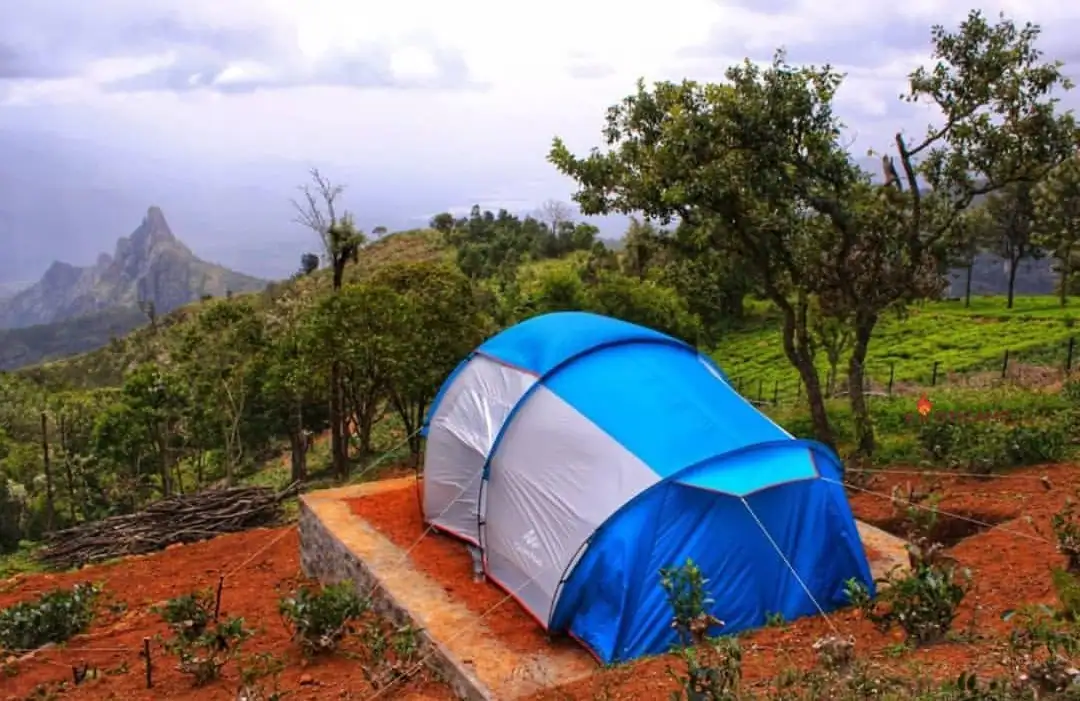Looking for some awesome locations for solo camping in India? Then, my friend, you need to consider a few important factors.
For solo camping, the location should be safe and close to a nearby city or village, and it should be fun and rich in natural beauty.
Luckily, India has plenty of amazing places to camp outside, far from the crowd, dangers and hustle-bustle of city life.
In this post, I have mentioned some of the best solo camping places in India that are enjoyable, safe, and immersed in nature.
Table Of Content
- Is solo Camping safe in India?
- Best Solo Camping places in India
- How to Pick the Right Campsite
- Can you Pitch your Tent Anywhere?
- Benefits of Solo Camping in India
- Challenges You Might Face
- What to Consider for Solo Camping?
- Tips and Tricks
1. Is Solo Camping Safe in India?
Generally, solo camping is safe across India, and thousands of people embark on these amazing trips every year. However, the complete safety of your camping experience heavily depends on several factors such as location, weather, and preparation.
- Location: Choose a safe camping spot close to a village or city for easy access to help.
- Weather: Check the weather forecast and avoid camping during extreme conditions.
- Preparation: Bring essential gear, inform someone about your plans, and have a first-aid kit.
- Wildlife and Environment: Be aware of local wildlife and respect the environment to avoid attracting animals.
2. Solo camping places in India
a) Rishikesh, Uttarakhand
Nestled in the lap of the Himalayas, Rishikesh is not only a spiritual hub but also a haven for solo campers seeking tranquility amidst nature’s beauty.
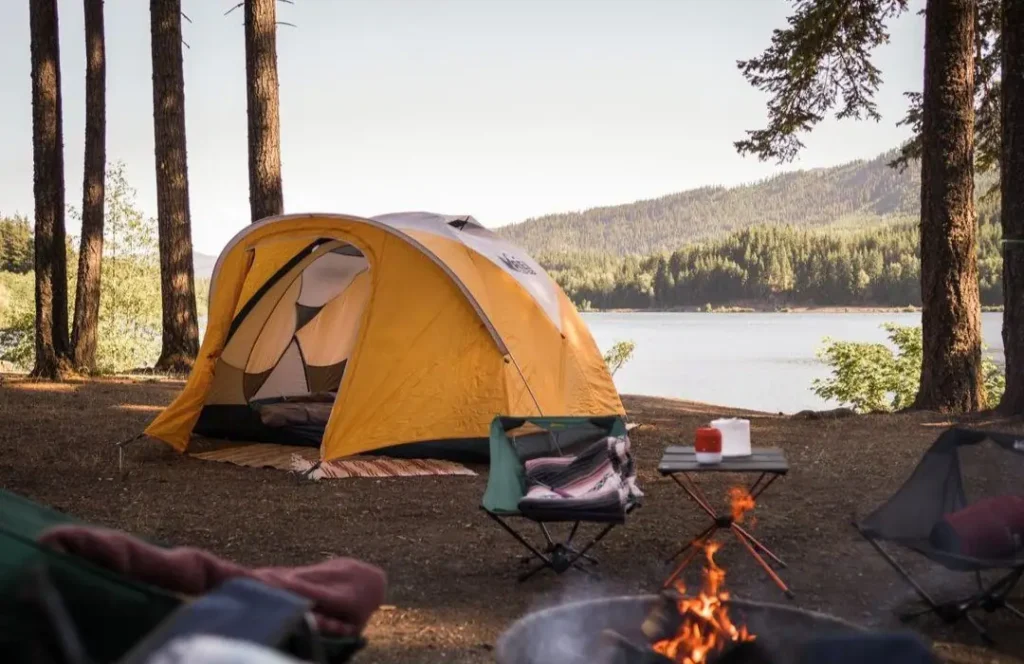
Image by Instagram
With numerous camping sites along the banks of the Ganges River, mountains, forest, beaches and more, solo travelers have plenty of options to choose from. These sites offers a picture perfect surrounding, water facility, rich nature, solitude and peace to ensuring a comfortable stay under the stars.
It is also the most famous camping hub in India, with thousands of peoples including families, friends, couples, and even kids arrive to experience true camping amidst nature. Plus, the best time for this activity is October to June.
While Rishikesh is generally safe for solo campers, it’s essential to be cautious, especially during the monsoon season when the water levels in the river can rise rapidly. It’s advisable to camp at designated sites and follow safety guidelines provided by camp organizers.
b) Spiti Valley, Himachal Pradesh
Tucked away in the remote corners of Himachal Pradesh, Spiti Valley is a paradise for adventure seekers and solitude lovers alike.
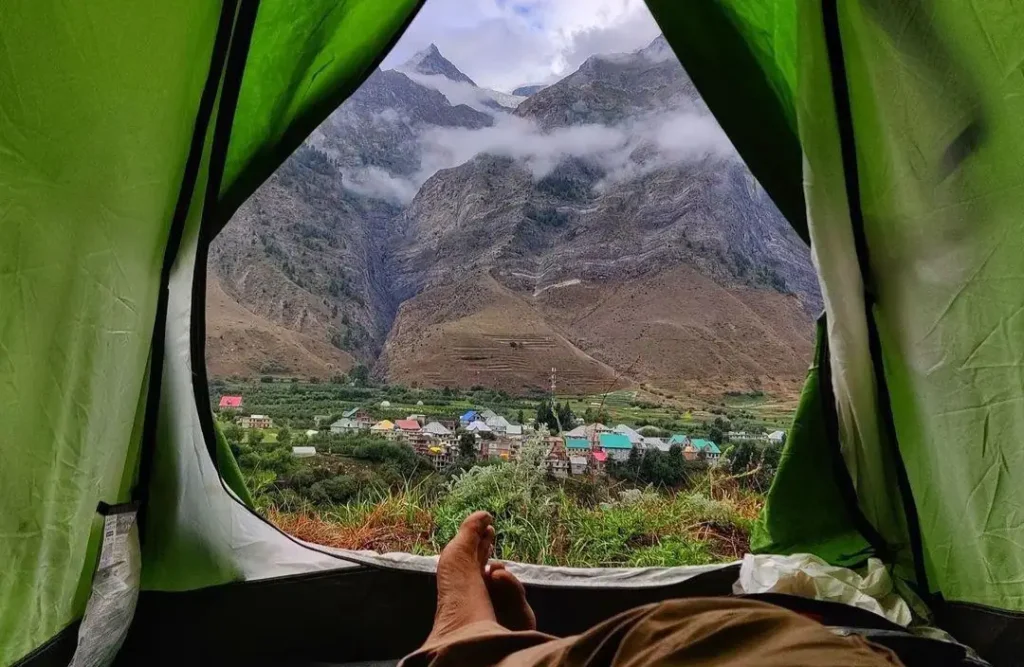
Image by Instagram
Camping in Spiti Valley offers a raw and untamed experience, with vast expanses of barren landscapes, meadows and snow-capped peaks as your backdrop. While facilities may be limited, the unparalleled beauty of the surroundings more than makes up for it.
Prepare to be mesmerized by the stark beauty of Spiti Valley, where every turn reveals a breathtaking panorama. The clear blue skies during the day give way to a canvas of stars at night, making it a surreal setting for solo campers.
Despite its rugged allure, Spiti Valley can pose challenges, especially in terms of altitude sickness and unpredictable weather conditions. It’s crucial to acclimatize slowly, stay hydrated, and carry adequate supplies. Additionally, be cautious while trekking or exploring remote areas alone.
c) Puskhar, Rajasthan
Pushkar, renowned for its vibrant culture and spiritual allure, is a haven for solo campers amidst Rajasthan’s mesmerizing desert landscapes.
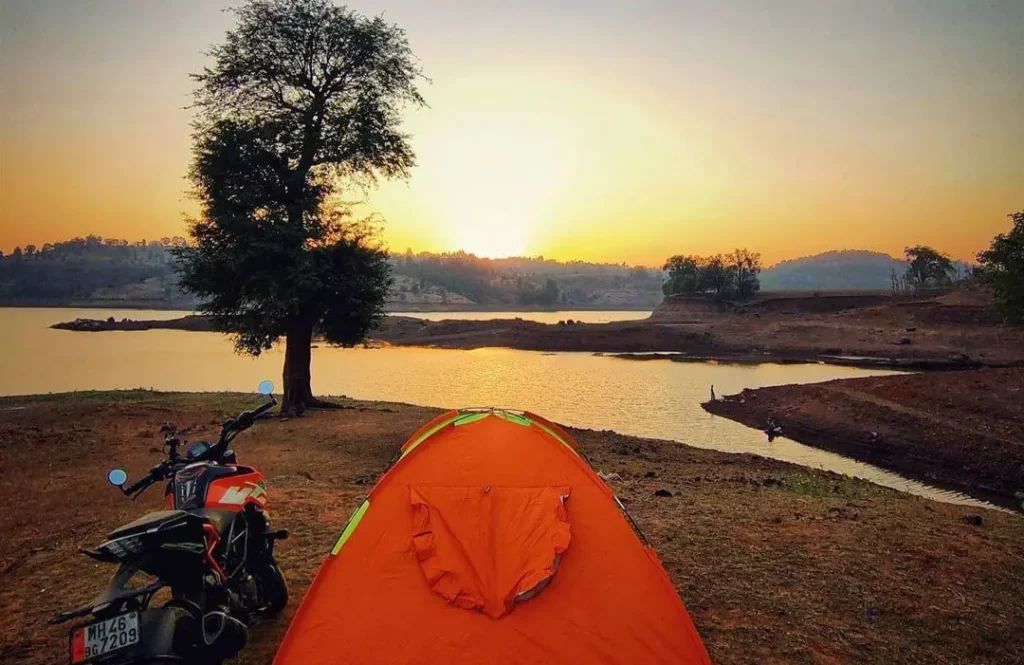
Image by Instagram
Pushkar offers solo campers a variety of options, from pitching their own tents to pre-set campsites. While resorts and cottages are available for added comfort, solo camping allows for a deeper connection with nature.
For the best camping experience, visit Pushkar during the cooler months of October to March. Solo camping here is best for adventurers seeking solitude and cultural immersion. Remember to respect local customs and traditions to enhance your experience.
While Pushkar is relatively safe for solo campers, it’s important to stay cautious, especially in the desert. Be mindful of dehydration and extreme temperatures, and avoid venturing too far alone.
d) Alleppey, Kerala
Alleppey, famously known for its backwaters, offers a unique camping experience amidst the tranquil waters of the Vembanad Lake. Solo campers can choose from options like setting up tents on the lake shores or renting houseboats for a more comfortable stay.
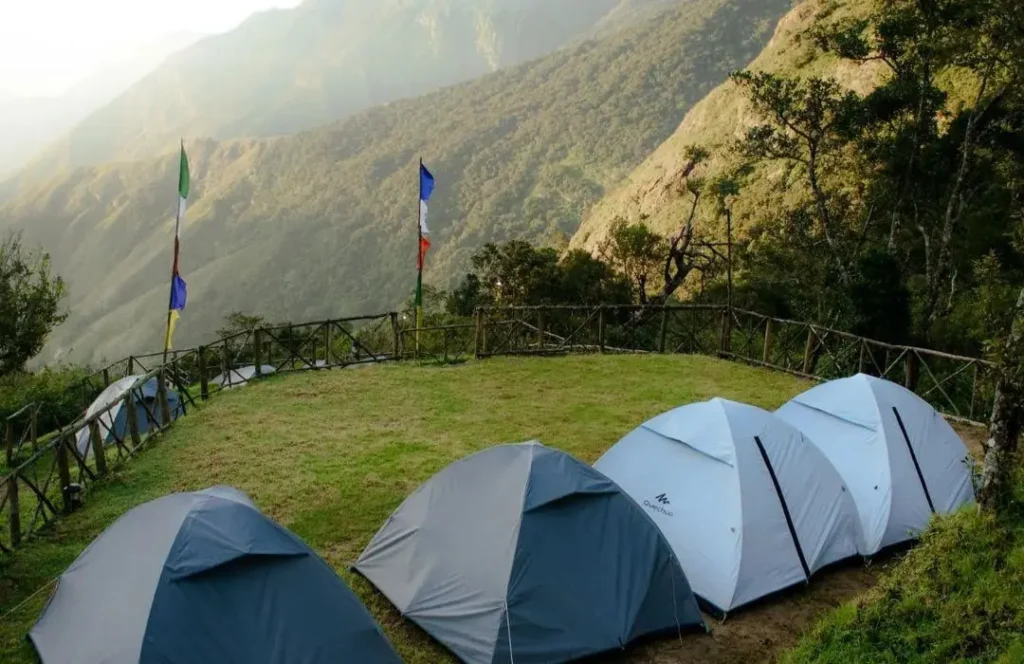
Image by Instagram
Camping in Alleppey provides a serene escape surrounded by lush greenery and picturesque landscapes. The gentle rhythm of the backwaters, accompanied by the chirping of birds, creates a peaceful ambiance perfect for relaxation and introspection.
Alleppey is best suited for solo campers looking for a tranquil retreat amidst nature’s bounty and The best time for camping in Alleppey is during the winter months from November to February when the weather is pleasant and conducive for outdoor activities.
Don’t miss the opportunity to explore the backwaters through a traditional Kerala houseboat cruise, offering a unique perspective of the region’s natural beauty.
e) Ladakh, Jammu & Kashmir
Nestled amidst the Himalayas, Ladakh beckons solo campers to discover tranquility amidst nature’s grandeur.
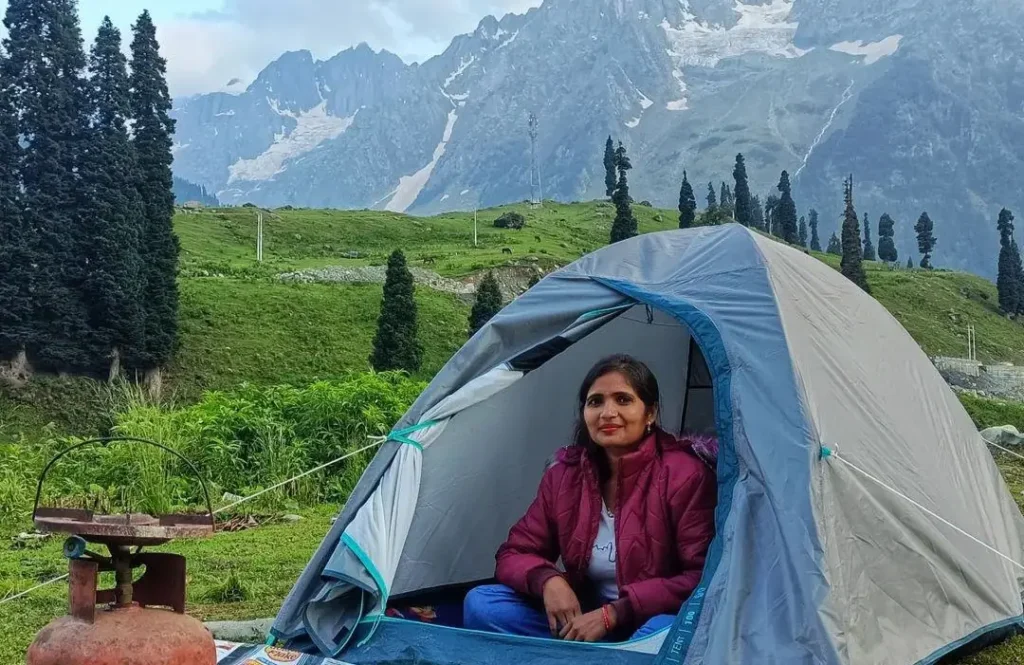
Image by Instagram
With numerous camping sites dotting its rugged landscape, solo travelers have a myriad of options to choose from, ranging from the shores of Pangong Lake to the valleys of Nubra, each offering its own unique charm and serenity.
Ladakh is renowned as a premier camping destination, attracting adventurers from all corners of the globe who seek solace and adventure amidst its breathtaking vistas. Whether it’s families seeking a weekend escape or couples craving a romantic getaway, Ladakh offers something for everyone.
The best time to embark on a camping adventure in Ladakh is from May to September when the weather is mild and the roads are accessible, allowing travelers to explore its pristine beauty to the fullest. However, it’s essential for solo campers to exercise caution, particularly during the monsoon season when sudden rainfall can lead to flash floods and landslides.
f) Coorg, Kerala
Nestled amidst the misty hills of the Western Ghats, Coorg stands out as a haven for solo campers seeking solace amidst its sprawling coffee estates.
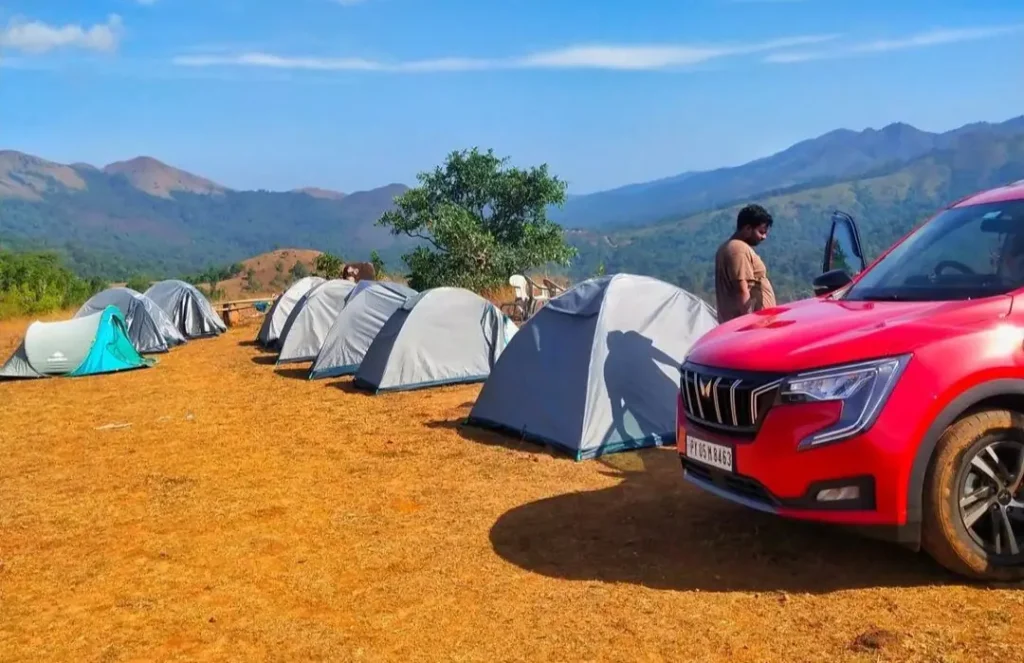
Image by Instagram
With its enchanting aroma and serene ambiance, Coorg’s coffee plantations offer a unique backdrop for camping enthusiasts to unwind and reconnect with nature.
Renowned as the “Scotland of India,” Coorg captivates visitors with its picturesque landscapes and vibrant culture, making it a sought-after destination for camping escapades.
The best time to embark on a camping adventure in Coorg is from October to March, when the weather is cool and the coffee plantations are in full bloom, painting the landscape in hues of green and gold.
However, solo campers should exercise caution, particularly during the monsoon season when heavy rainfall can transform the terrain. Stick to designated camping areas and immerse yourself in Coorg’s natural splendor for an unforgettable camping experience.
g) Goa Beach
Nestled along the sun-kissed shores of the Arabian Sea, Goa beckons solo campers to experience its unique blend of coastal charm and vibrant culture.

Image by Instagram
Famed for its pristine beaches and lively atmosphere, Goa is the ultimate destination for solo travelers seeking a beachside camping adventure.
Renowned as India’s party capital, Goa offers a myriad of camping options, from secluded beach spots to bustling beachfront campsites, catering to every camper’s preference.
The best time to indulge in a camping escapade in Goa is from November to February when the weather is pleasant and the beach activities are in full swing.
However, solo campers should exercise caution, especially during the peak tourist season when Goa’s beaches can get crowded. Stick to designated camping areas and soak in the coastal beauty of Goa for an unforgettable camping experience.
h) Agumbe, Western Ghat
Nestled amidst the misty peaks of the Western Ghats, Agumbe stands out as a paradise for solo campers seeking an immersive experience in nature’s embrace.
Famed as the “Cherrapunji of the South,” Agumbe offers a unique camping experience amidst its dense rainforests and cascading waterfalls.
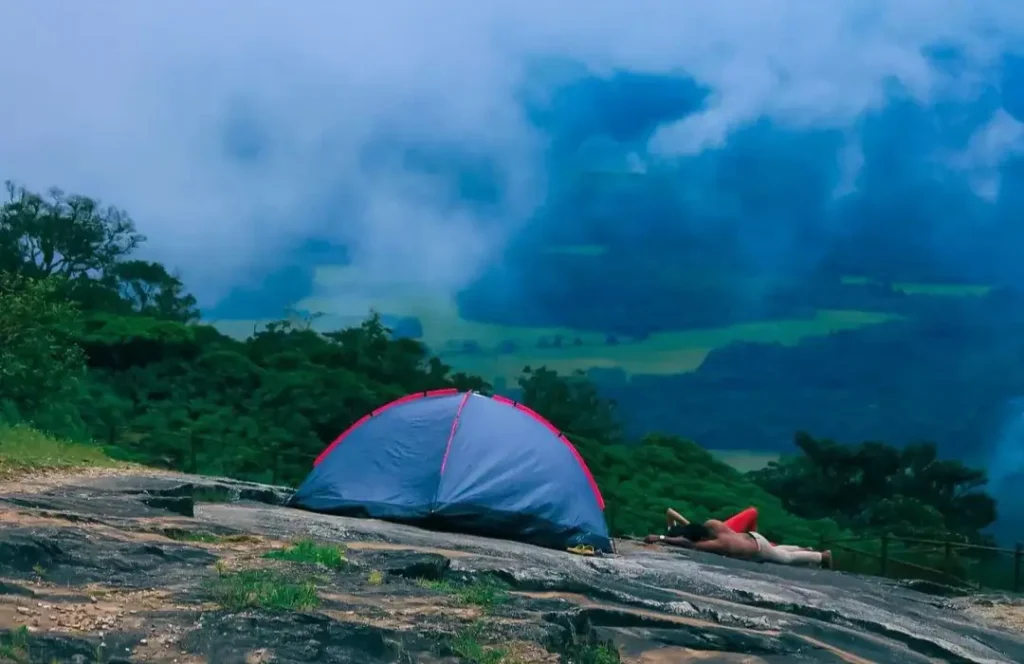
Image by Instagram
Renowned for its rich biodiversity and stunning landscapes, Agumbe’s rainforests provide the perfect backdrop for solo travelers looking to reconnect with nature.
One of the best camping spots in Agumbe is the Barkana Falls campsite, where campers can pitch their tents near the majestic waterfall and fall asleep to the soothing sounds of cascading water.
The best time to embark on a camping adventure in Agumbe is during the monsoon season when the rainforests come alive. However, solo campers should exercise caution, as the trails can get slippery during heavy rainfall.
3. How to Pick the Right Campsite
If you don’t know which site is suitable and perfect for you, then consider these points for an idea and short listing.
- Research potential camping sites: Look for well-established camping areas with positive reviews and safety records.
- Location – The location should be secluded amidst nature, but also close proximity to a nearby city or village for any emergency or daily necessities.
- Weather – Weather of the campsite, should be clear and warm. Make sure it is not rainy, or too cold.
- Check for facilities: Ensure the site offers essential amenities such as clean water, restroom facilities, and designated camping areas.
- Consider the environment: Choose a site that matches your comfort level and outdoor skills, whether it’s a remote wilderness area or a developed campground.
- Assess safety measures: Look for safety features like fire pits, emergency contact information, and ranger stations nearby.
- Plan for emergencies: Familiarize yourself with the area’s emergency protocols and bring essential safety gear like a first aid kit and communication devices.
4. Can you Pitch your Tent Anywhere?
No! You can’t pitch your tent anywhere in India. The location should be either designated or secluded from the crowd.
If you pick a secluded place from the cities, like forest, riverside, mountains, plateau, meadows, desert and more, then you re completely safe and allowed to camp.
Just make sure the location is a few meters or kilometers away from a major city but also close enough for any emergency or necessities.
5. Benefits of Solo Camping in India
Solo camping offers a unique and enriching experience that every camping enthusiast should try once in their life. Plus doing it in India adds an extra layer of adventure and beauty. Here are some benefits of solo camping in India:
- Personal Growth: Solo camping helps build self-reliance, confidence, and problem-solving skills as you navigate and manage everything on your own.
- Peace and Solitude: Enjoy the tranquility and solitude of nature, away from the hustle and bustle of daily life.
- Flexibility and Freedom: You can plan your trip according to your own preferences, pace, and interests without having to compromise with others.
- Cultural Exploration: Camping in India allows you to explore diverse cultures, traditions, and cuisines, enriching your travel experience.
- Scenic Beauty: India offers a wide range of breathtaking landscapes and biodiversity, from mountains and forests to deserts and beaches.
- Adventure and Thrill: Experience the thrill of camping in remote and unique locations, whether it’s the Himalayas, the Western Ghats, or the Thar Desert.
- Affordability: Solo camping in India can be quite affordable, with many budget-friendly camping spots and lower travel costs compared to group trips.
- Local Interaction: Solo camping often leads to meaningful interactions with locals, who can offer valuable insights and hospitality.
- Spiritual Experience: India is known for its spiritual heritage, and camping in serene locations can provide a deeply spiritual and rejuvenating experience.
6. Challenges You Might Face
In solo camping, you will also face some challenges and difficulties you are all alone and the nature can be quite harsh.
- More hard work – You will be alone, so basically you have to do everything yourself, from setting your tent to cooking to prepare bedding and more.
- Safety Concerns: Ensuring personal safety in remote or unfamiliar areas can be difficult.
- Weather Variability: Unpredictable weather, from heavy rains to extreme heat, can disrupt plans.
- Wildlife Encounters: Dealing with wildlife, especially in forested or mountainous regions, requires caution.
- Navigation Issues: Navigating without clear markers or trails can be challenging in India’s diverse terrains.
- Limited Infrastructure: In remote areas, finding basic amenities and supplies can be tough.
- Language Barriers: Communication can be difficult in regions where English or Hindi is not widely spoken.
- Health Concerns: Access to medical facilities can be limited in isolated locations, forests and near villages..
- Cultural Differences: Understanding and respecting diverse local customs is crucial.
- Isolation: Dealing with loneliness and lack of immediate support can be challenging in secluded spots.
- Environmental Impact: Maintaining eco-friendly practices requires extra effort due to varied local conditions.
7. What to Consider for Solo Camping?
Before you embark on your camping trip, there are something you should consider fr a safe and dun trip.
- Location
- backing
- Safety
- Weather
- Permisison or legalities
- Surrodunging
- Wildlife
8. Tips For Solo Camping
- Plan Thoroughly: Research your destination, map out your route, and inform someone about your itinerary.
- Pack Wisely: Bring essential gear, including a reliable tent, sleeping bag, first-aid kit, and extra food and water.
- Stay Aware: Keep an eye on your surroundings, watch for wildlife, and be mindful of changing weather conditions.
- Arrive Early: Set up camp while there’s daylight to avoid navigating and pitching tents in the dark.
- Respect Nature: Leave no trace, follow local regulations, and respect wildlife habitats and natural resources.
- Stay Connected: Carry a charged phone, a map, and a portable charger for emergencies, but also embrace moments of digital detox.
- Trust Your Instincts: Listen to your gut feeling and be prepared to adjust plans if something doesn’t feel right.
- Engage with Locals: Build rapport with locals for valuable insights, assistance, and cultural exchange.
- Practice Self-Care: Stay hydrated, get enough rest, and prioritize safety over pushing your limits.
- Embrace the Experience: Be open to unexpected adventures, connect with nature, and savor the moments of solitude and serenity.
FAQs
1. Is it OK to go camping alone?
2. Are there any solo camping sites near Delhi that offer a secluded and peaceful experience?
3. Can I go solo camping if I’m not an experienced outdoors person?
Wrap up
From the tranquil shores of Rishikesh to the rugged trails of Spiti Valley, solo camping in India offers a blend of adventure, solitude, and cultural immersion.
In short, it can be a memorable experience of tranquility, nature solitude and experience. Plus, India, with its diverse biodiversity and amazing location, add another fun layer to it.
Armed with essential tips and a spirit of exploration, dive into India’s diverse landscapes and forge unforgettable memories under the stars.
So, pack your gear, open your heart to new experiences, and let India’s best solo camping spots become the backdrop for your next great adventure.
Good luck for your next camping trip


